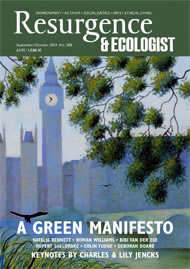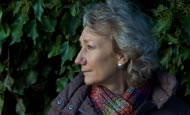If you had breath for no more than 99 words, what would they be? This is the question I began asking after a serious injury left me suddenly unable to talk, read or sit comfortably for more than a few minutes. Soon afterwards it emerged that underlying this was a genetic condition which continues indefinitely to impose disabling limits on my energy and time.
Why 99? I had made films about Islamic art and history and I remembered that, according to the Qur’an, the Creator and the whole of creation can be expressed in 99 names – and 99 words were as much as I could manage. I sent out my request, like a message in a bottle, to the voices I most wanted to hear – writers, musicians, artists, thinkers. It was my way of asking for help.
More than I could ever have imagined came back. Each one of over 100 responses offered a unique lifeline and helped me to navigate a way through the crisis and beyond. Some reminded me of what matters most. Others suggested where to look for hope and inspiration.
It took seven years – and a lot of help from friends – to put together the book 99 words, now published by Darton, Longman and Todd. I’m immensely grateful to all those who contributed. Not only did they give their time and words freely, but they also helped me to realise, as Nelson Mandela wrote, “how precious words are”.
A significant group chose to focus on peace: the values and qualities that are its building blocks, and the difficult emotions and obstacles that stand in its way. Here are two pieces, with additional reflections, from Scilla Elworthy and Inua Ellams.
Scilla Elworthy
If I look back I see
that fear lied to me.
“You’ll fail,” it said to me when I started out on the path.
“And here’s how,” painting detailed pictures of pain.
When I was on the way fear scared me again and again.
“Too weak, too old, turn back.”
I did walk on, but encumbered by this load.
It wasn’t easy,
but it wasn’t what I’d been told.
I didn’t fail.
Without the load I might have stumbled less.
The trick is to hear
when it is fear speaking
and hear it fast enough to let it drop.
So how do we transform fear into some possibility of peace? I’m sure you know what I mean… You wake up at 3am, with cold chills about some dreaded outcome. You toss and turn for an hour, and it just gets worse, until the fear has become a monster looming above you, and you’re pinned to the pillow.
When that happens to me, I know (having spent many entirely sleepless nights) that it’s the moment to get up, make a cup of tea, and deal with the fear directly. What I do is to sit in one chair, and I’m the parent, and the fear is in the other chair, and it’s the frightened child. So I talk to it, and ask what it feels like. Then I go and sit in fear’s chair and answer. The answer often surprises me, because it will speak from the depth of the feeling and reveal things I didn’t know. Then I swap back (yes, it does feel a little bit mad) and ask it what it actually needs. Fear will always tell you what it needs if you’re prepared to listen. Once I know what it needs – usually it includes reassurance, a reality check, and an action plan – we can agree what we need to do. And then I say: “Now we have a plan, we can go back to sleep, and in the morning we’ll do what we planned. OK?”
And we do.
Inua Ellams
Our senses vary. For instance, my ears might not be attuned as yours, and your eyes might take more light. The contrasts may be slight, but imagine each of your senses differed from mine and we could ‘feel’ divergently about an identical experience. Consider now seven billion people, their combination of senses unique, each ‘feeling’ our planet differently, and you’ll find there as many worlds as there are people. Try to heed the views of others, you might have missed a thing or two, and if given the chance, share your world, no one sees it as you do.
I read the beginnings of Bertrand Russell’s The Problems of Philosophy when I was too young really to be thinking such things. So many unscored basketball points, missed opportunities to scuff my knees, and unclimbed molehills resulted from stumbling across those dog-eared pages. I found myself craving silences and dark places to think and attempt to digest Russell’s thoughts.
To explore the twin concepts of appearance and reality, he used a table. I used a basketball – half in shadow, half in light. On the topic of human knowledge, he used Mount Everest. I used a molehill. Those were early attempts at bringing questions of the world’s nature down to the dusty, conflicted, ant-crawling outbacks of my own Nigerian South London ’hood; to relate the globe’s happening to my small ones. It set the stage for my work as a poet and writer. It widened my tiny life so powerfully, so generously, that I wished to share it, and for others to share theirs.
This is always the first step towards peace – to take into consideration narratives of why we think certain things, why things appear the way they do. For after intimate communication, we better understand our planet and ourselves.
Shirley Williams’ 99 words were published in Resurgence & Ecologist issue 279 and Fergal Keane's in Resurgence & Ecologist 280. The 2013 International Day of Peace is 21 September 2013. 99 pence from the sale of each copy of the book will go to support the work of Peace Direct. For more information: www.internationaldayofpeace.org, www.peacedirect.org, www.99words.co.uk








